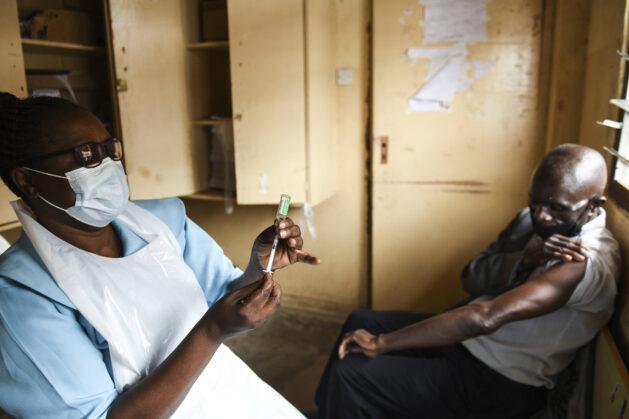Africa-Press – Mauritius. India and South Africa had first made similar requests back in October 2020. The US, the UK and Switzerland – countries that have significant pharmaceutical industries – argue that waiving patents will discourage companies from investing in the research and development necessary for vaccine development.
The roll-out of vaccines The WTO works on the basis of consensus. Even if the majority want a waiver, the wealthy minority have stalled their request.
In the present form, most people in developing economies are unlikely to be vaccinated this year. Substantial numbers will have to wait until next year or even later.
With the pandemic still raging and waves of new variants mutating – with more expected – the stalling of the requested waiver will almost certainly delay achieving global herd immunity. As the virus spreads easily and rapidly, there is a clear lesson: without global vaccine coverage, there will be no international herd immunity.
The Covax initiative of the World Health Organisation (WHO) aims for equitable vaccine distribution, on the principle that ‘with a fast-moving pandemic, no one is safe until everyone is safe.
Stalling a global vaccine roll-out will also slow plans for an economic turnaround: the roll-out of vaccines is the best hope for a quick return to normality.
Most developing countries cannot afford vaccines at the selling price in the US: the cost is $25-$37 per dose for the Moderna and $19 for the Pfizer. Even for wealthier developing countries, there is a chronic shortage of supply – at any price.
The UK and the European Union have been embroiled in a stand-off over supplies. Despite this, the UK has vaccinated more than 64% of its population [Ed.
note: Figures from 27 April] with one shot, while across the EU it varies between 70% (Malta) and 10% (Bulgaria) [Ed. note: Figures from 27 April]. The US, which started vaccinations late last year, had more than 25% of the population vaccinated with at least one shot by late March.
President Joe Biden promises 200 million people will have been vaccinated by the end of June. Yet the Covax initiative has struggled to provide small consignments of vaccines to a few countries in Africa, with Ghana and Rwanda leading the pack.
Vaccination rates in Africa remain troublingly low. Experts reckon that developing countries will have to wait until 2023 or 2024 to receive enough vaccines to reach herd immunity.
That will be too late. In the meantime, many will lose their lives. Waiving patent rights in emergencies Against this background, India and South Africa asked the WTO to waive patent protection of Covid-19 vaccines.
Their request, backed by two-thirds of the WTO member countries, was to ensure that patent rights “do not create barriers to the timely access to affordable medical products including vaccines and medicines.
The proposed waiver would be time-bound, in force until “widespread vaccination is in place globally, and the majority of the world’s population has developed immunity”.
Some myths about the role of patents in encouraging innovation have surfaced in the ensuing debate. The first is that patent rights are needed to create vaccines.
There is some evidence that patents encourage limited investment in the pharmaceutical industry. This evidence is weak and does not support unqualified protection for inventions.
Despite this, pharmaceutical executives and politicians claim that, without strong patent protection, pharmaceutical companies would not have developed vaccines.
In fact, the US government financed the Moderna vaccine with a $2.5bn grant covering most of the cost. BioNTech, key to the development of the Pfizer-BioNTech vaccine, received more than $445m from the German government.
Pfizer also benefited from a US government promise to purchase $2bn worth of vaccines. One lesson from the Covid pandemic is that governments are willing to heavily subsidise vaccine development during such emergencies, making investments in vaccine development very lucrative.
The billions of dollars that developed countries have committed to vaccine purchase exceeds the costs of production. Patent-holders will still be able to recoup their investments in vaccine development with significant profit.
The waiver would give developing countries vaccines they would otherwise have been unable to buy. Waiving patent rights in emergencies is not a new idea.
The US government invoked the Defense Production Act to force manufacturing giant 3M to prioritise the production of N95 masks. The WTO’s compulsory licensing rules were used by a number of its members, including Rwanda and Zimbabwe, to tackle the HIV/AIDS pandemic.
Some might ask: why suspend patent protection rather than use compulsory licensing? Compulsory licensing procedures have been part of the Trade-Related Aspects of Intellectual Property Rights agreement since the WTO’s inception, but they have rarely been used.
Compulsory licensing takes time, as there are several processes that the beneficiary country has to complete. Ideally, licensing authorities need to negotiate first with the patent rights-holders.
Furthermore, rights-holders are entitled to royalty payments even if their invention is used under compulsory licensing. Compulsory licences are also non-assignable and would be subject to judicial review in the licensing country.
Bottom line Time is of the essence with the Covid emergency. The tortuous process of compulsory licensing isn’t the best solution. Fair access to vaccines requires more radical action.
Moderna’s announcement that it will not enforce its vaccine patents during the pandemic is a hopeful start. If enough pressure is put on the other pharmaceutical companies, they could share their know-how with other companies to allow a faster roll-out.
A phrase used repeatedly during the Covid pandemic has been “we are in this together”. It reminds us of the late songwriter John Lennon’s plea to “Imagine there’s no countries” – a world without borders.
The pandemic has shaken the world. No nation, rich or poor has been spared: we are indeed in this together. For a few wealthy nations to reject a request for a patent-protection waiver suggests that not all agree.
If we are truly to be in this together and if the world is to prevent millions of avoidable deaths, a radical change from this brand of economic nationalism is urgently needed.
For More News And Analysis About Mauritius Follow Africa-Press







